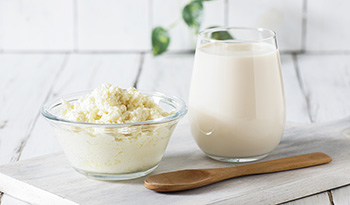Best Supplements for Fall and Winter: Boost Health During Seasonal Changes

As cooler weather approaches and we begin to swap our summer t-shirts for fall sweaters, it's not just our apparel that we should reevaluate. While some supplements are ideal for year-round support, others may be more useful in certain seasons. This is because the human body is more susceptible to different types of illnesses or conditions depending on the time of year.
For example, foodborne illnesses are more common in the summer, with foods being eaten outside in the heat, where they can spoil quickly. In the winter, airborne viruses are more commonly spread throughout the world population. The weather may also affect our mental wellness and vitamin production levels.
Let's look at how you can adjust your supplement routine as we transition from warmer to cooler seasons this year.
Foundational Daily Supplements
Some supplements are fundamental to your health and are most beneficial when taken throughout the year. Here are a few supplements you may want to consider taking on a daily basis, no matter the season.
Multivitamin
A good multivitamin should be taken every day. Multivitamins contribute to the proper functioning of your body and all of your body systems. Many multivitamins contain antioxidants like vitamins A, C, and E, which help reduce oxidative stress caused by everyday living.
Multivitamins also contain B vitamins, which are great for energy and vitality, and vitamin D, which is essential for a variety of functions in the body, including bone and immune health. Zinc and magnesium are minerals the body needs daily that are typically found in most multivitamins. Magnesium helps the body make protein and bone while helping to keep blood sugar stable. Zinc is also a key nutrient for healthy blood sugar, helping the body produce and store insulin properly. Other key contributions of zinc include immunity, wound healing, metabolism, reproductive, and thyroid function.
The purpose of multivitamins is to supply your body with any essential nutrients that you may not be getting from your regular diet. They can offer a plethora of benefits and should be taken by most, especially if you have increased nutritional needs or specific nutrient gaps.
Probiotics
Most of us have heard the gut microbiome is responsible for much more than just our gastrointestinal health. Your gut microbiome is a sophisticated ecosystem of microorganisms that live in your intestines. Also called gut microbiota or gut flora, these microbes include bacteria, fungi, archaea, and viruses that live in our digestive tract.
Probiotics, which are live microbes, offer a range of health benefits in the gut and beyond. Probiotics can help establish healthy gut flora that helps with digestion, immune response, metabolism, as well as endocrine and nervous system functions.
Heart health can be improved with lower cholesterol levels and decreased blood pressure. Some studies show that probiotics may alleviate symptoms of depression, anxiety, and other mental health conditions that are affected by the gut-brain axis. Allergy reduction, weight management, and enhanced nutrient absorption may also be beneficial effects of probiotic supplements.
All of these benefits should be appreciated year-round with the use of probiotic supplements. Eating probiotic-rich foods such as kefir, sauerkraut, yogurt, and kimchi can also garner these benefits.
Omega-3 Fatty Acids
Omega-3 fatty acids are essential nutrients that play a variety of critical roles in the body. Eating foods such as fatty fish including salmon and mackerel, walnuts, soybeans, and flax seed oil can help to increase your omega-3 levels. Most modern diets do not provide sufficient omega-3 fatty acids, so taking a supplement year-round could be beneficial.
Heart, eye, and brain health are three of the key areas that omega-3s are known to support. Omega-3s can help to lower blood pressure, slow plaque buildup in arteries, and reduce triglycerides which can all help to prevent heart disease and stroke. Since omega-3s are important components of our brain and retina and are found in high concentrations in both areas, they help to nourish the eye and brain. Studies have shown that omega-3 supplementation may help prevent cognitive decline.
Omega-3 fatty acids are anti-inflammatory and can help with any number of conditions, from arthritis to diabetes, depression, migraines, and fibromyalgia. These are just a few conditions that can benefit from anti-inflammatory supplements, as almost all chronic illness begin with inflammation.
Other benefits of omega-3s include better sleep, asthma prevention, and reduced risk of stroke and heart disease. Supplementing your daily routine with omega-3 fatty acids year-round is ideal for optimal health and well-being.
Fall and Winter Supplements
As cold and flu season approaches, these are some supplements you may want to add to your daily routine in addition to the year-round recommendations.
Quercetin
This powerful antioxidant could pack a powerful punch against colds and flu. Quercetin is a plant flavonoid that helps support a rapid immune response to upper respiratory infections. It has been shown to prevent viruses from entering cells and interacting with cellular components that are critical for viral replication.
Not only can quercetin help to prevent infection, but it can also reduce inflammation caused by infection. Rhinovirus is an example of how quercetin has been shown to reduce viral load and the inflammatory response to the virus. Furthermore, clinical trials have also found that 12 weeks of quercetin supplementation can reduce the severity of cold symptoms in adults and the number of sick days taken to recover.
Considering the effects quercetin has on infection prevention and symptoms, it is a great contender for a seasonal addition to your daily supplement routine.
Garlic
In addition to its cardiovascular health and blood sugar support effects, garlic is also a great immune system booster. Garlic can help destroy viruses and kill other microorganisms by boosting the immune system.
One review found pre-clinical data demonstrated that garlic has potential antiviral activity against different human, animal, and plant pathogenic viruses by blocking viral entry into host cells.
Clinical studies further demonstrated a prophylactic effect of garlic in the prevention of widespread viral infections in humans by enhancing their immune response. This review highlights that garlic possesses significant antiviral activity and can be used prophylactically in the prevention of viral infections.
Another less obvious benefit of garlic is its ability to alleviate musculoskeletal pain by reducing the effects of pro-inflammatory cytokines. The diallyl disulfide in garlic helps to relieve sore muscles and joints when applied topically. This could help many people who experience increased soreness and joint pain in cooler weather.
Garlic has powerful antiviral and anti-inflammatory effects and could be a great addition to your supplement routine to align with the cooler weather in fall and winter.
Cinnamon
A warming spice, cinnamon is traditionally used in seasonal recipes during the cooler months of the year. Cinnamon also has many health benefits that should be considered as an ideal winter supplement.
Research has shown that cinnamon may help protect against certain viruses, including influenza that spreads rapidly in cold winter months. With all of the sweets consumed around the holiday season, cinnamon's blood sugar-lowering properties in those with diabetes should not be dismissed. Cinnamon may also improve insulin sensitivity, which improves blood sugar levels.
Additional potential health benefits of cinnamon include lowering blood pressure, improving digestion, reducing cholesterol, improving cognitive function, and pain management. Cinnamon also has powerful antioxidant properties which protect against oxidative damage.
It's important to note that cinnamon contains a chemical called coumarin, which can be harmful to the liver. Even smaller amounts of coumarin can cause liver damage in especially susceptible people, but the effect is usually reversible. Consuming large amounts of cassia cinnamon or taking supplements with this ingredient can be dangerous, especially for children, smaller adults, and people with liver disease.
If you are looking to build a great defense against influenza while keeping your blood sugar in check, cinnamon is a top contender for your winter supplement routine.
5-HTP
Seasonal Affective Disorder, or (SAD) is a common condition that is brought on by cold and dark conditions we see during the fall and winter months in some regions of the world. SAD is a type of depression that's characterized by a recurrent seasonal pattern, most often in fall or winter. SAD symptoms include:
- Feeling sad, anxious, or "empty"
- Loss of interest or pleasure in activities you used to enjoy
- Fatigue, decreased energy, or feeling slowed down
- Oversleeping, difficulty sleeping, or daytime drowsiness
- Overeating, particularly with a craving for carbohydrates or lack of appetite
- Weight gain
- Feeling like "hibernating"
- Difficulty concentrating, remembering details, and making decisions
- Physical aches or pains, headaches, cramps, or digestive problems
- Decreased sex drive
Because 5-hydroxytryptophan (5-HTP) is a precursor to serotonin, it may boost serotonin levels and have a positive effect on mood, depression, anxiety, sleep, appetite, and pain.
However, taking 5-HTP with certain prescription antidepressants can increase the risk of serotonin syndrome, a serious side effect caused by too much serotonin in the body.
If you tend to experience symptoms of SAD during the fall and winter, 5-HTP could be the seasonal supplement you need to brighten your days and support your mental health.
Elderberry
Elderberries are the fruit of the black elder tree. They are dark purple berries that are rich in vitamins and antioxidants, including polyphenols that can prevent cell damage that leads to disease.
Some studies show that elderberries may help support cold and flu symptoms by reducing congestion and duration of illness. Elderberry is also high in vitamin C, which can support healthy immune function.
Elderberry supplements come in a variety of forms, including liquids, syrups, lozenges, capsules, and gummies. Stock up on your favorite form of this winter supplement superstar to help avoid cold and flu this season.
The Big Picture
Use this season supplement guide to help you adjust your supplement routine as the fall and winter months roll in.
While taking certain supplements year-round, such as multivitamins, probiotics, and omega-3s is ideal, other supplements may be better suited for cooler weather and the pathogens that come along with a cold, crisp breeze.
Quercetin, garlic, cinnamon, 5-HTP, and elderberry are great seasonal health supplements everyone should consider.
Always talk to a trusted healthcare provider before adding new supplements to your routine. Especially when considering cinnamon with existing liver disease or 5-HTP while taking prescription antidepressants.
References:
- Romero M, Duarte J. Probiotics and Prebiotics in Cardiovascular Diseases. Nutrients. 2023;15(17):3686. Published 2023 Aug 23. doi:10.3390/nu15173686
- Hills RD Jr, Pontefract BA, Mishcon HR, Black CA, Sutton SC, Theberge CR. Gut Microbiome: Profound Implications for Diet and Disease. Nutrients. 2019;11(7):1613. Published 2019 Jul 16. doi:10.3390/nu11071613
- Appleton J. The Gut-Brain Axis: Influence of Microbiota on Mood and Mental Health. Integr Med (Encinitas). 2018;17(4):28-32.
- Rizky WC, Jihwaprani MC, Mushtaq M. Protective mechanism of quercetin and its derivatives in viral-induced respiratory illnesses. The Egyptian Journal of Bronchology. 2022;16(1):58. doi:10.1186/s43168-022-00162-6
- Welty FK. Omega-3 fatty acids and cognitive function. Curr Opin Lipidol. 2023;34(1):12-21. doi:10.1097/MOL.0000000000000862
- Dighriri IM, Alsubaie AM, Hakami FM, et al. Effects of Omega-3 Polyunsaturated Fatty Acids on Brain Functions: A Systematic Review. Cureus. 2022;14(10):e30091. Published 2022 Oct 9. doi:10.7759/cureus.30091
- Heinz SA, Henson DA, Austin MD, Jin F, Nieman DC. Quercetin supplementation and upper respiratory tract infection: A randomized community clinical trial. Pharmacol Res. 2010;62(3):237-242. doi:10.1016/j.phrs.2010.05.001
- Ganesan S, Faris AN, Comstock AT, et al. Quercetin inhibits rhinovirus replication in vitro and in vivo. Antiviral Res. 2012;94(3):258-271. doi:10.1016/j.antiviral.2012.03.005
- Rouf R, Uddin SJ, Sarker DK, et al. Antiviral potential of garlic (Allium sativum) and its organosulfur compounds: A systematic update of pre-clinical and clinical data. Trends Food Sci Technol. 2020;104:219-234. doi:10.1016/j.tifs.2020.08.006
- Rao PV, Gan SH. Cinnamon: a multifaceted medicinal plant. Evid Based Complement Alternat Med. 2014;2014:642942. doi:10.1155/2014/642942
- Wieland LS, Piechotta V, Feinberg T, et al. Elderberry for prevention and treatment of viral respiratory illnesses: a systematic review. BMC Complement Med Ther. 2021;21(1):112. Published 2021 Apr 7. doi:10.1186/s12906-021-03283-5
- Maffei ME. 5-Hydroxytryptophan (5-HTP): Natural Occurrence, Analysis, Biosynthesis, Biotechnology, Physiology and Toxicology. Int J Mol Sci. 2020;22(1):181. Published 2020 Dec 26. doi:10.3390/ijms22010181
DISCLAIMER:This Wellness Hub does not intend to provide diagnosis...
















































































 Table of Contents
Table of Contents















